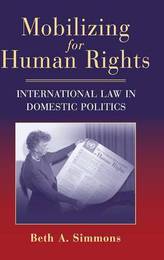
|
Mobilizing for Human Rights: International Law in Domestic Politics
Hardback
Main Details
| Title |
Mobilizing for Human Rights: International Law in Domestic Politics
|
| Authors and Contributors |
By (author) Beth A. Simmons
|
| Physical Properties |
| Format:Hardback | | Pages:468 | | Dimensions(mm): Height 234,Width 156 |
|
| ISBN/Barcode |
9780521885102
|
| Classifications | Dewey:341.48 |
|---|
| Audience | | Professional & Vocational | |
|---|
| Illustrations |
23 Tables, unspecified; 30 Line drawings, unspecified
|
|
Publishing Details |
| Publisher |
Cambridge University Press
|
| Imprint |
Cambridge University Press
|
| Publication Date |
29 October 2009 |
| Publication Country |
United Kingdom
|
Description
This volume argues that international human rights law has made a positive contribution to the realization of human rights in much of the world. Although governments sometimes ratify human rights treaties, gambling that they will experience little pressure to comply with them, this is not typically the case. Focusing on rights stakeholders rather than the United Nations or state pressure, Beth Simmons demonstrates through a combination of statistical analyses and case studies that the ratification of treaties leads to better rights practices on average. Simmons argues that international human rights law should get more practical and rhetorical support from the international community as a supplement to broader efforts to address conflict, development, and democratization.
Author Biography
Beth Simmons is Clarence Dillon Professor of International Affairs at Harvard University and has also taught at Duke University, the University of California at Berkeley, and Harvard. Her book, Who Adjusts? Domestic Sources of Foreign Economic Policy During the Interwar Years, 1924-1939, was recognized by the American Political Science Association in 1995 as the best book published in 1994 in government, politics, or international relations. Her article, "International Law and State Behavior: Commitment and Compliance in International Monetary Affairs," won the Heniz Eulau Award for the best article published in the American Political Science Review in 2000. Her research also regularly appears in such journals as International Organization, World Politics, the Journal of Legal Studies, and the Journal of Conflict Resolution.
Reviews'Mobilizing for Human Rights is a magisterial work of scholarship. It substantially advances our understanding of human rights law in domestic and international politics. Due to its exceptional rigor, this book will help settle some of the most highly contested debates, and will surely spark new ones. It constitutes an outstanding achievement for interdisciplinary studies.' Ryan Goodman, New York University School of Law 'Mobilizing for Human Rights brilliantly combines theory and systematic empirical analysis to demonstrate how international human rights law affects state policies by altering the domestic political environment. Beth Simmons has written what will become a classic work integrating the study of international relations with that of domestic politics.' Robert O. Keohane, Woodrow Wilson School of Public and International Affairs, Princeton University 'This is a very powerful study of the impact of international law and the evolution of an international human rights regime. As Simmons notes, the development of such a regime has been a major change in world politics since World War II. Her book provides one of the most well articulated theories of why the human rights regime has evolved as an international treaty system. And it presents one of the most in depth empirical studies of the major elements of that regime. It advances the novel argument that governments sign and comply with human rights treaties because they mobilize domestic groups to demand such behavior. This book will make a major contribution to our study of world politics by showing that international law can matter and that the recognition of human rights can change the behavior of governments.' Helen V. Milner, Princeton University 'Simmons has written simply the most important new work by a social scientist on international law and human rights. This rigorous, persuasive, and theoretically eclectic book should be required reading for any scholar or graduate student interested in the topic.' Kathryn Sikkink, University of Minnesota 'This is one of the most important books on international human rights in decades. For more than thirty years, researchers have tried unsuccessfully to use regression analysis to show that human rights treaties make a difference. In this book, Harvard Professor Beth Simmons cracks the code, developing a well-grounded theory of political contexts in which signing a human rights treaty should yield improved human rights on the ground, and then offering rigorous statistical tests that confirm the theory. This book is a must read for anyone who wants to understand when and how human rights law works.' Professor Richard H. Steinberg, UCLA School of Law 'This book marshals theoretical arguments and empirical evidence to show that, under certain conditions, a state's public law-like commitment in the form of agreeing to an international human rights treaty has a noticeable positive impact on domestic human rights outcomes.' International Affairs
|